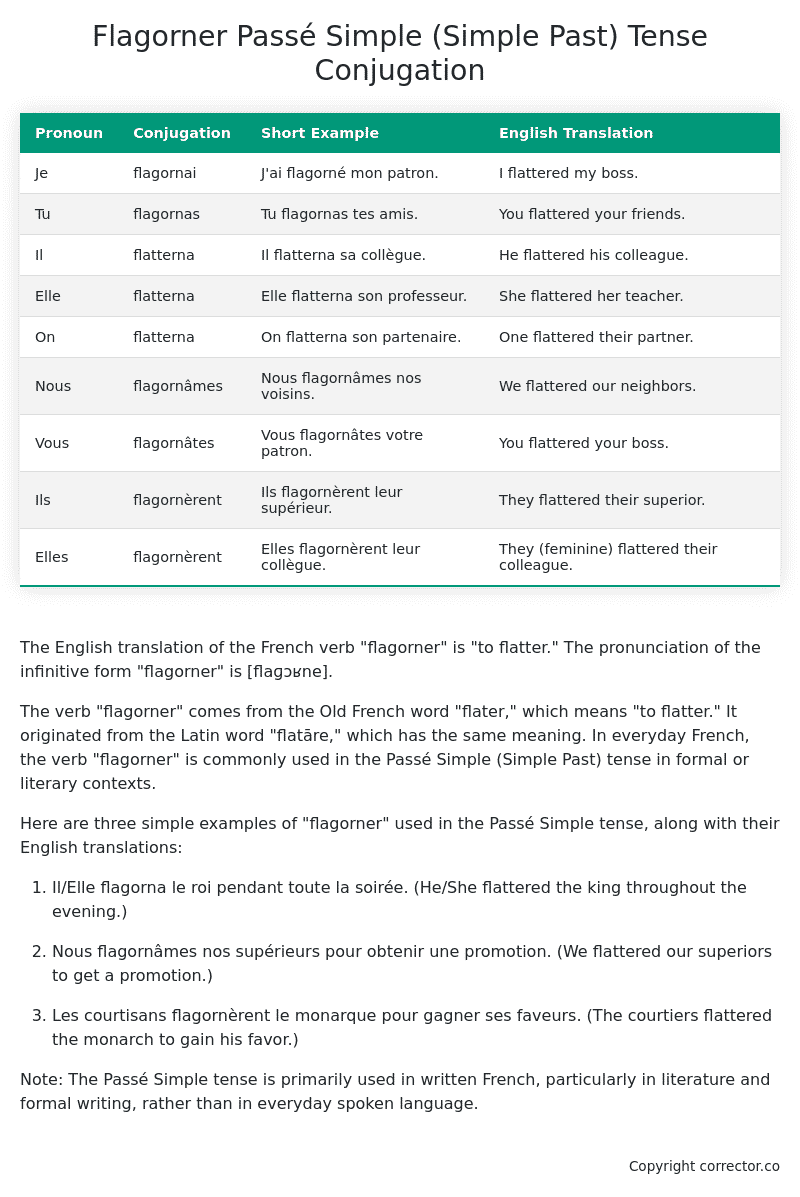Passé Simple (Simple Past) Tense Conjugation of the French Verb flagorner
Introduction to the verb flagorner
The English translation of the French verb “flagorner” is “to flatter.” The pronunciation of the infinitive form “flagorner” is [flaɡɔʁne].
The verb “flagorner” comes from the Old French word “flater,” which means “to flatter.” It originated from the Latin word “flatāre,” which has the same meaning. In everyday French, the verb “flagorner” is commonly used in the Passé Simple (Simple Past) tense in formal or literary contexts.
Here are three simple examples of “flagorner” used in the Passé Simple tense, along with their English translations:
-
Il/Elle flagorna le roi pendant toute la soirée.
(He/She flattered the king throughout the evening.) -
Nous flagornâmes nos supérieurs pour obtenir une promotion.
(We flattered our superiors to get a promotion.) -
Les courtisans flagornèrent le monarque pour gagner ses faveurs.
(The courtiers flattered the monarch to gain his favor.)
Note: The Passé Simple tense is primarily used in written French, particularly in literature and formal writing, rather than in everyday spoken language.
Table of the Passé Simple (Simple Past) Tense Conjugation of flagorner
| Pronoun | Conjugation | Short Example | English Translation |
|---|---|---|---|
| Je | flagornai | J’ai flagorné mon patron. | I flattered my boss. |
| Tu | flagornas | Tu flagornas tes amis. | You flattered your friends. |
| Il | flatterna | Il flatterna sa collègue. | He flattered his colleague. |
| Elle | flatterna | Elle flatterna son professeur. | She flattered her teacher. |
| On | flatterna | On flatterna son partenaire. | One flattered their partner. |
| Nous | flagornâmes | Nous flagornâmes nos voisins. | We flattered our neighbors. |
| Vous | flagornâtes | Vous flagornâtes votre patron. | You flattered your boss. |
| Ils | flagornèrent | Ils flagornèrent leur supérieur. | They flattered their superior. |
| Elles | flagornèrent | Elles flagornèrent leur collègue. | They (feminine) flattered their colleague. |
Other Conjugations for Flagorner.
Le Present (Present Tense) Conjugation of the French Verb flagorner
Imparfait (Imperfect) Tense Conjugation of the French Verb flagorner
Passé Simple (Simple Past) Tense Conjugation of the French Verb flagorner (You’re reading it right now!)
Passé Composé (Present Perfect) Tense Conjugation of the French Verb flagorner
Futur Simple (Simple Future) Tense Conjugation of the French Verb flagorner
Futur Proche (Near Future) Tense Conjugation of the French Verb flagorner
Plus-que-parfait (Pluperfect) Tense Conjugation of the French Verb flagorner
Passé Antérieur (Past Anterior) Tense Conjugation of the French Verb flagorner
Futur Antérieur (Future Anterior) Tense Conjugation of the French Verb flagorner
Subjonctif Présent (Subjunctive Present) Tense Conjugation of the French Verb flagorner
Subjonctif Passé (Subjunctive Past) Tense Conjugation of the French Verb flagorner
Subjonctif Imparfait (Subjunctive Imperfect) Tense Conjugation of the French Verb flagorner
Subjonctif Plus-que-parfait (Subjunctive Pluperfect) Tense Conjugation of the French Verb flagorner
Conditionnel Présent (Conditional Present) Tense Conjugation of the French Verb flagorner
Conditionnel Passé (Conditional Past) Tense Conjugation of the French Verb flagorner
Conditionnel Passé II (Conditional Past II) Tense Conjugation of the French Verb flagorner
L’impératif Présent (Imperative Present) Tense Conjugation of the French Verb flagorner
L’impératif Passé (Imperative Past) Tense Conjugation of the French Verb flagorner
L’infinitif Présent (Infinitive Present) Tense Conjugation of the French Verb flagorner
L’infinitif Passé (Infinitive Past) Tense Conjugation of the French Verb flagorner
Le Participe Présent (Present Participle) Tense Conjugation of the French Verb flagorner
Le Participe Passé (Past Participle) Tense Conjugation of the French Verb flagorner
Struggling with French verbs or the language in general? Why not use our free French Grammar Checker – no registration required!
Get a FREE Download Study Sheet of this Conjugation 🔥
Simply right click the image below, click “save image” and get your free reference for the flagorner Passé Simple tense conjugation!

Flagorner – About the French Passé Simple (Simple Past) Tense
Formation
Usage
Narration
Historical Context
Interactions with other tenses
Passé Composé
Imparfait
Conditional and Subjunctive
Summary
I hope you enjoyed this article on the verb flagorner. Still in a learning mood? Check out another TOTALLY random French verb conjugation!


